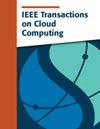Transfer Learning Based Multi-Objective Evolutionary Algorithm for Dynamic Workflow Scheduling in the Cloud
IF 5
2区 计算机科学
Q1 COMPUTER SCIENCE, INFORMATION SYSTEMS
引用次数: 0
Abstract
Managing scientific applications in the Cloud poses many challenges in terms of workflow scheduling, especially in handling multi-objective workflow scheduling under quality of service (QoS) constraints. However, most studies address the workflow scheduling problem on the premise of the unchanged environment, without considering the high dynamics of the Cloud. In this paper, we model the constrained workflow scheduling in a dynamic Cloud environment as a dynamic multi-objective optimization problem with preferences, and propose a transfer learning based multi-objective evolutionary algorithm (TL-MOEA) to tackle the workflow scheduling problem of dynamic nature. Specifically, an elite-led transfer learning strategy is proposed to explore effective parameter adaptation for the MOEA by transferring helpful knowledge from elite solutions in the past environment to accelerate the optimization process. In addition, a multi-space diversity learning strategy is developed to maintain the diversity of the population. To satisfy various QoS constraints of workflow scheduling, a preference-based selection strategy is further designed to enable promising solutions for each iteration. Extensive experiments on five well-known scientific workflows demonstrate that TL-MOEA can achieve highly competitive performance compared to several state-of-art algorithms, and can obtain triple win solutions with optimization objectives of minimizing makespan, cost and energy consumption for dynamic workflow scheduling with user-defined constraints.基于迁移学习的云计算动态工作流调度多目标进化算法
管理云中的科学应用程序在工作流调度方面提出了许多挑战,特别是在服务质量(QoS)约束下处理多目标工作流调度。然而,大多数研究都是在环境不变的前提下解决工作流调度问题,而没有考虑云的高动态性。本文将动态云环境下的约束工作流调度建模为带偏好的动态多目标优化问题,提出了一种基于迁移学习的多目标进化算法(TL-MOEA)来解决动态工作流调度问题。具体而言,提出了一种以精英为主导的迁移学习策略,通过从过去环境中的精英解中迁移有用的知识,探索对MOEA的有效参数自适应,以加速优化过程。此外,还提出了多空间多样性学习策略,以保持种群的多样性。为了满足工作流调度的各种QoS约束,进一步设计了基于偏好的选择策略,使每次迭代都能得到有希望的解决方案。在5个知名的科学工作流上进行的大量实验表明,TL-MOEA算法与几种最先进的算法相比具有很强的竞争力,并且可以在用户自定义约束的动态工作流调度中获得以最小化完工时间、成本和能耗为优化目标的三赢方案。
本文章由计算机程序翻译,如有差异,请以英文原文为准。
求助全文
约1分钟内获得全文
求助全文
来源期刊

IEEE Transactions on Cloud Computing
Computer Science-Software
CiteScore
9.40
自引率
6.20%
发文量
167
期刊介绍:
The IEEE Transactions on Cloud Computing (TCC) is dedicated to the multidisciplinary field of cloud computing. It is committed to the publication of articles that present innovative research ideas, application results, and case studies in cloud computing, focusing on key technical issues related to theory, algorithms, systems, applications, and performance.
 求助内容:
求助内容: 应助结果提醒方式:
应助结果提醒方式:


